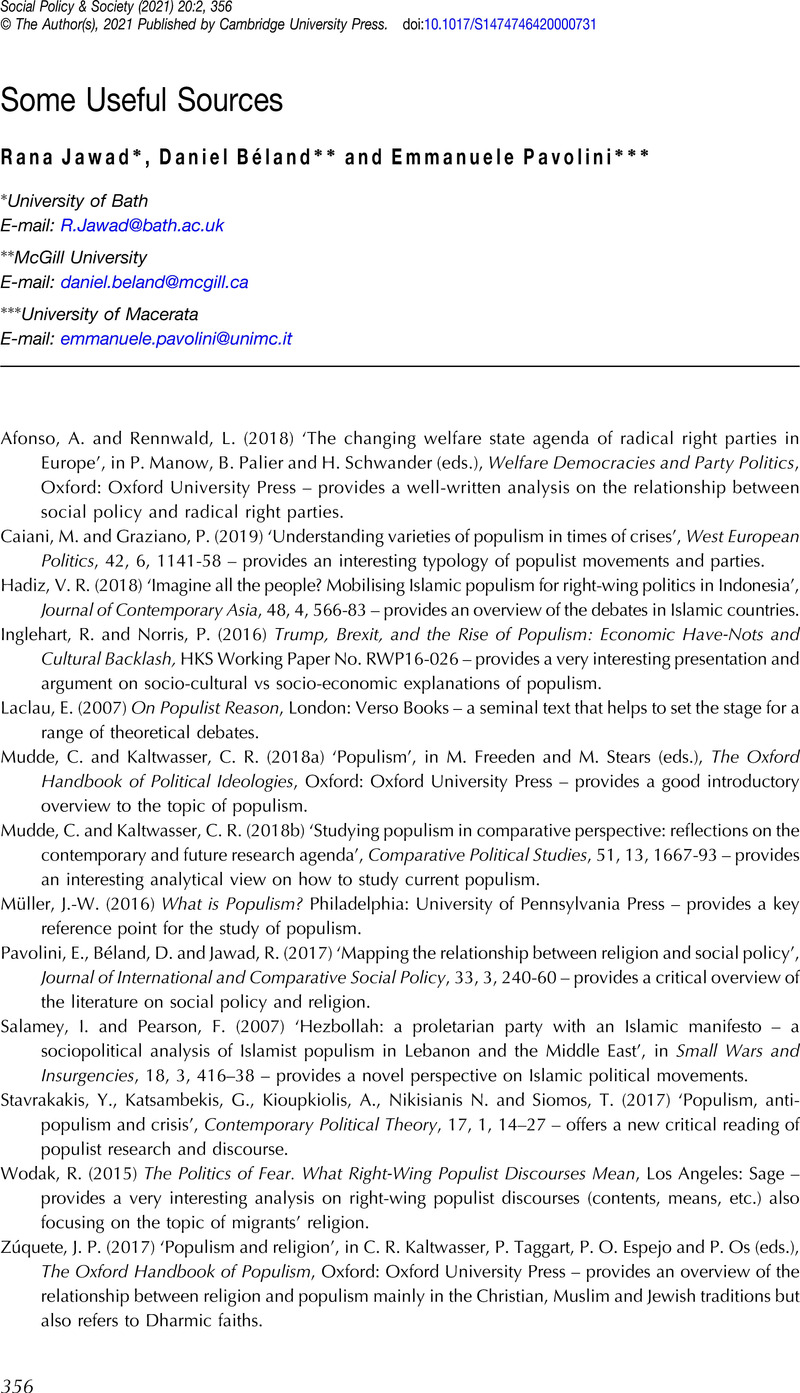No CrossRef data available.
Article contents
Some Useful Sources
Published online by Cambridge University Press: 10 March 2021
Abstract
An abstract is not available for this content so a preview has been provided. Please use the Get access link above for information on how to access this content.

- Type
- Themed Section: Populism, Religion and Social Policy
- Information
- Copyright
- © The Author(s), 2021. Published by Cambridge University Press
References
Afonso, A. and Rennwald, L. (2018) ‘The changing welfare state agenda of radical right parties in Europe’, in Manow, P., Palier, B. and Schwander, H. (eds.), Welfare Democracies and Party Politics, Oxford: Oxford University Press – provides a well-written analysis on the relationship between social policy and radical right parties.Google Scholar
Caiani, M. and Graziano, P. (2019) ‘Understanding varieties of populism in times of crises’, West European Politics, 42, 6, 1141-58 – provides an interesting typology of populist movements and parties.CrossRefGoogle Scholar
Hadiz, V. R. (2018) ‘Imagine all the people? Mobilising Islamic populism for right-wing politics in Indonesia’, Journal of Contemporary Asia, 48, 4, 566–83 – provides an overview of the debates in Islamic countries.CrossRefGoogle Scholar
Inglehart, R. and Norris, P. (2016) Trump, Brexit, and the Rise of Populism: Economic Have-Nots and Cultural Backlash, HKS Working Paper No. RWP16-026 – provides a very interesting presentation and argument on socio-cultural vs socio-economic explanations of populism.CrossRefGoogle Scholar
Laclau, E. (2007) On Populist Reason, London: Verso Books – a seminal text that helps to set the stage for a range of theoretical debates.Google Scholar
Mudde, C. and Kaltwasser, C. R. (2018a) ‘Populism’, in Freeden, M. and Stears, M. (eds.), The Oxford Handbook of Political Ideologies, Oxford: Oxford University Press – provides a good introductory overview to the topic of populism.Google Scholar
Mudde, C. and Kaltwasser, C. R. (2018b) ‘Studying populism in comparative perspective: reflections on the contemporary and future research agenda’, Comparative Political Studies, 51, 13, 1667–93 – provides an interesting analytical view on how to study current populism.CrossRefGoogle Scholar
Müller, J.-W. (2016) What is Populism? Philadelphia: University of Pennsylvania Press – provides a key reference point for the study of populism.CrossRefGoogle Scholar
Pavolini, E., Béland, D. and Jawad, R. (2017) ‘Mapping the relationship between religion and social policy’, Journal of International and Comparative Social Policy, 33, 3, 240–60 – provides a critical overview of the literature on social policy and religion.CrossRefGoogle Scholar
Salamey, I. and Pearson, F. (2007) ‘Hezbollah: a proletarian party with an Islamic manifesto – a sociopolitical analysis of Islamist populism in Lebanon and the Middle East’, in Small Wars and Insurgencies, 18, 3, 416–38 – provides a novel perspective on Islamic political movements.CrossRefGoogle Scholar
Stavrakakis, Y., Katsambekis, G., Kioupkiolis, A., Nikisianis, N. and Siomos, T. (2017) ‘Populism, anti-populism and crisis’, Contemporary Political Theory, 17, 1, 14–27 – offers a new critical reading of populist research and discourse.Google Scholar
Wodak, R. (2015) The Politics of Fear. What Right-Wing Populist Discourses Mean, Los Angeles: Sage – provides a very interesting analysis on right-wing populist discourses (contents, means, etc.) also focusing on the topic of migrants’ religion.CrossRefGoogle Scholar
Zúquete, J. P. (2017) ‘Populism and religion’, in Kaltwasser, C. R., Taggart, P., Espejo, P. O. and Os, P. (eds.), The Oxford Handbook of Populism, Oxford: Oxford University Press – provides an overview of the relationship between religion and populism mainly in the Christian, Muslim and Jewish traditions but also refers to Dharmic faiths.Google Scholar




